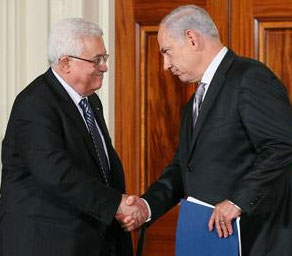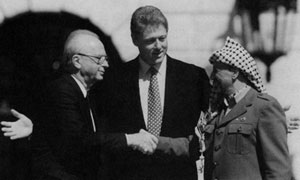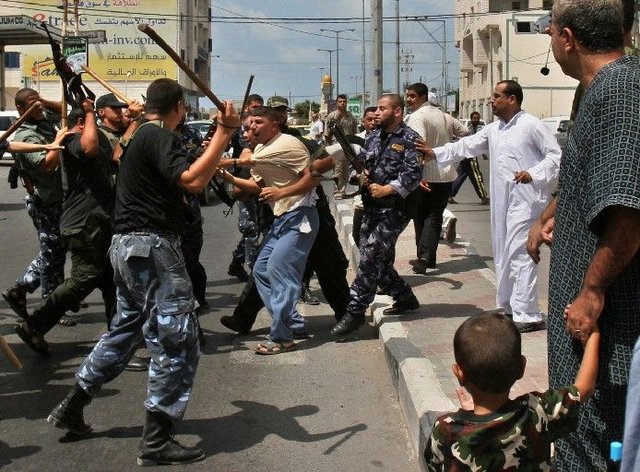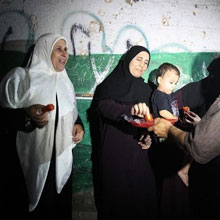
| THINK-ISRAEL |
| HOME | July-August 2010 Featured Stories | Background Information | News On The Web |

As the latest round of Israeli/Palestinian peace talks begin today,[1] it is hard not to feel deep cynicism. We have seen such events being presented to the world as big media events, but the hope, like the media hype, diminishes at every occasion.
The most memorable rapprochement happened in 1978 when Menachem Begin of Israel and Anwar Sadat engaged in talks that would eventually lead to them both signing a historic peace deal. Those talks had been negotiated under the Jimmy Carter Administration in the "Camp David Accords" On March 26, 1979, the two men signed their peace deal.
Since the Six Day War when Israel's Arab neighbors, assisted by Russia had failed to crush Israel (with Egypt losing control of Sinai in the process), Israel had been shunned by Arab nations. The decision by Egypt to acknowledge Israel's right to exist was genuinely historic. Sadat and Begin were jointly awarded the Nobel Peace Prize in 1979, but a price had to be paid. Sinai was returned to Egypt, but for his rapprochement with the "Zionist enemy" Anwar Sadat was regarded as a traitor to the Arab world.
On October 6, 1981, while watching a military parade and air show, Sadat was assassinated[2] by gunmen firing from a military truck. Two grenades had been thrown into the presidential stand, causing chaos. Sadat's vice president Hosni Mubarak, was escorted from the scene. Sadat and ten others were killed. The Palestinian Liberation Organization refused to condemn the assassination,[3] with one official (Nabil Ramlawi) claiming: "We were expecting this end of President Sadat because we are sure he was against the interests of his people, the Arab nations and the Palestinian people" In Tripoli, Libya, news of Sadat's killing led to celebrations in the street.
From 1987 onwards, the "(First) Palestinian Intifada" erupted, and this only came to an end with a second historic agreement.

The Oslo Accords of 1993 were celebrated publicly with a photo opportunity in Washington on September 13th, 1993, with Bill Clinton posing with arms outstretched like a madonna of beatitude while Yitzhak Rabin shook hands with Yasser Arafat. The agreement had nothing to do with America, but the Clinton publicity machine wanted to present an image of America the peace-maker. Clinton's administration had more success with the Dayton Accords where fighting in Bosnia ended after Richard Holbrooke threatened to bomb any party that did not agree, and Clinton scored points in securing a Northern Ireland peace agreement (once Ted Kennedy had been persuaded to stop supporting[4] IRA extremists).
The Oslo Accords had been negotiated in secret[5] in Oslo, with 14 meetings held in camera in Norway and three more elsewhere before the two factions had signed an agreement on August 30, 1993. Bill Clinton and U.S. Secretary of State Warren Christopher had — apparently — not even been aware of the negotiations.
On issues as sensitive as negotiations between two entities that have been in a state of conflict, long diplomatic engagements, without the pressure of a press and public hungry to receive instant gratification, are the only way to prepare the ground for an engagement.
In a sad symmetry that mirrored the fate of Sadat, Yitzhak Rabin was murdered[6] two years after the Oslo Accords were signed, on November 4, 1992, shot dead by Yigal Amir, an Israeli student.

The Second Intifada erupted in September 2000, and much has happened since. The PLO no longer exists as a great political force in Palestinian regions. Yasser Arafat died in 2004. AT the time, he was the head of the Palestinian National Authority (PNA or PA). The Oslo Accords had made provisions for a body to be set up to govern the territories of the West Bank and the Gaza Strip, and also a Palestinian police force.
Hamas Fatah Split
The PA received massive amounts of funding from the U.S.A. and Europe. In January 2006,[7] elections in Gaza had brought Hamas 76 of the 132 parliamentary seats and the mandate of government. With Gaza Strip government led by Ismail Haniyeh, foreign funds were channeled through the West Bank. This led to further tensions between Hamas and Fatah, with Hamas members in the Gaza Strip throwing[8] Fatah members from buildings and vice versa.[9]
Mahmoud Abbas, of the more secular Fatah group, was made President of the PA in January 2005. His term of office should have ended in January last year, but he has extended his term of office. His position in the current peace talks, when his presence as leader of the PA is not fully legitimated, is problematic. Were he to step down, there could be further chaos in the West Bank.
Abbas had planned[10] to have PNA elections on January 24, 2010, but Hamas' leader Khaled Meshaal, objected. Meshaal[11] lives in Syria and has led Hamas since 2004. Meshaal had also rejected Abbas' suggestions of early election for 2009. On both occasions, Meshaal wanted there to be reconciliation talks between Hamas and Fatah.
There are other issues that weaken Abbas' role as a representative, capable of arguing on behalf of the Palestinians. The political split with Hamas-ruled Gaza is one. The other is ideological. Even though Fatah has been guilty of terrorism (via its terror wing, Ala-Aqsa Martyrs Brigade) it is not totally opposed to the existence of Israel. Hamas is an Islamist group and its 1988 Charter — never revised or abrogated — maintains that its ultimate aim is to destroy Israel. Similarly, Hezbollah, the Lebanon-based Shia terrorist group led by Hassan Nasrallah[12] is active in the region. Both Hamas and Hezbollah receive funding and weaponry from Iran. While external agencies are funding Palestinian factions and insurgents and they — like Hamas — have no desire for rapprochement with Israel, Abbas cannot give any cast iron assurances for the future.
In 2006, Hezbollah incursions achieved their desired aims — a war[13] between Lebanon and Israel. This war weakened the Christian factions in Lebanon's government and created a situation where Israel was demonized in the international media. While these rogue elements are active, and there is a leftist media that actively seeks to delegitimize Israel, any peace could be so easily undermined.
What will mar any agreement within the Middle East may no longer have anything to do with politics. Religion is dividing the camps of Hamas and Fatah further. Hamas invokes Islamic Hadiths in its charter that justify fighting against Israel. In Article 7 of the Charter[14] can be found these words:
"The Islamic Resistance Movement is one of the links in the chain of the struggle against the Zionist invaders. It goes back to 1939, to the emergence of the martyr Izz al-Din al Kissam and his brethren the fighters, members of Muslim Brotherhood. It goes on to reach out and become one with another chain that includes the struggle of the Palestinians and Muslim Brotherhood in the 1948 war and the Jihad operations of the Muslim Brotherhood in 1968 and after."Moreover, if the links have been distant from each other and if obstacles, placed by those who are the lackeys of Zionism in the way of the fighters obstructed the continuation of the struggle, the Islamic Resistance Movement aspires to the realisation of Allah's promise, no matter how long that should take. The Prophet, Allah bless him and grant him salvation, has said:
"The Day of Judgement will not come about until Muslims fight the Jews (killing the Jews), when the Jew will hide behind stones and trees. The stones and trees will say O Muslims, O Abdulla, there is a Jew behind me, come and kill him. Only the Gharkad tree, would not do that because it is one of the trees of the Jews." (related by al-Bukhari and Muslim)"
In a political setting, negotiations can be achieved. But in a setting of religious or racial conflict, it is far harder to find reasonable solutions, and far harder to defuse conflicts.

America
The role of America in negotiating a peace settlement should never be criticized, if it is a sincere effort. Sadly, under the current administration, it seems that official announcements have been made to appease the Arab/Muslim world, to gain credibility.
Real peace talks can begin, but they can never get anywhere when they are subjected to the demands of the presidential publicity machine, or have journalists trying to report back to their public every piece of information.
There is a real fear that the administration could be merely grandstanding. A real peace requires a lot of deep thinking, and so far the president has sided with Abbas to demand that Israel stop building settlements.
Abbas had previously laid down preconditions[15] for talks, demanding that Israel must halt settlements, particularly in Jerusalem.
The cessation of settlement construction may slightly help the situation, but it is not the role of the United States to dictate conditions, when it should be convening talks as impartially as possible, to find a way forward. Once, America was Israel's strongest ally. At this moment in time there is understandable Israeli caution about the motives of the U.S. administration. Israel cannot give away any more of its territory. It has already given away enough of the land it once had when it was proclaimed as a new nation on May 14, 1948.
After the president's Iraq speech, there is a fear that this could be another exercise in window-dressing, as hollow as Bill Clinton's photographed pose with Rabin and Arafat.
The Oslo Accords were not perfect, but they provided a scheme which has existed to this day. But there can be no more demands made of Israel. No other state has been forced to justify its legitimacy by weakening it borders or its ability to defend itself.
The success of the Oslo agreements came because an independent entity (Norway was not even part of the European Union) hosted numerous secret talks. Certain presidents who failed when they tried to be tough — such as Jimmy Carter — have tried to rebuild themselves later as peace-makers.
America's current administration is not even trying to be seen as a winner of battles, and is hoping that if it portrays itself as a beacon of benevolence and tolerance that it will gain credibility. The Middle East is volatile, where Arabs are riven by factions who detest each other. The Arabs have had little to unify them. Under the Ottomans they felt outsiders, and the Pan-Arabist movement died after the Six Day War. Now, only Libya and Syria have "Pan-Arabist" ideals.
There must be some moves for peace, but the Arab nations must put their houses in order. The OIC aims to draw Muslim nations together, and with Turkey and Iran within this sphere, Israel has little hope. The United Nations, the body which approved Israel's existence, has ceased to be an impartial place for conflict resolution for almost a decade. It has virtually abandoned the country it helped create.
With an American president who can only make anodyne speeches, Israel may have to wait for a stronger and more focused administration to host peace negotiations.
It would be uplifting if something good comes from the peace talks, but I think that this meeting could just be another presidential exercise in media manipulation, hoping to gain a good impression before the midterms. A lasting peace needs a long commitment, and support.
The Quartet (UN, USA, EU and Russia) was set up in 2002 to assist in creating peace in the Middle East. It has achieved little so far.
Maybe Norway could offer some advice......
Note by Editor, Think-Israel.
We would like to congratulate both FSM and Adrian Morgan on his new position as Editor of FSM.
This next, an excerpt, is also from the pages of FSM. It was written by
Michael Sall and is called "More Peace from the Religion of Peace?" It
appeared September 3, 2010.
(http://www.familysecuritymatters.org/publications/id.7251/pub_detail.asp).
It is about the reaction of some ordinary Arabs to the ambushing and
slaying August 31, 2010 of 4 Israelis as they were driving in their
car. They were from Beit Chagai near Hebron. Yitzhak and Talya Imes
were the parents of 6 children, including a year old infant. The other
woman in the car, Kochava Even-Haim, was pregnant. Avishai Shendler,
who recently moved to Beit Chagai, was also killed. To add to the
horror, Kochava's husband, a Zaka volunteer, was dispatched to the
scene of the terrorist attack and there discovered his wife was one of
the victims.
In the Wye River talks in 1998, in Benjamin Netanyahu's first term
as prime minister, he gave away 80% of Hebron, Judaism's second
holiest city, to the Arabs. More recently, roadblocks had been
removed, so that it is easier to access roads used by Jewish
civilians. The latest peace negotiation started September 2, 2010.

The Arabs in Gaza were wildly cheering with joy at the terrorist killing of an Israeli family of 4 including a pregnant woman. Should we read anything into these outbursts of joy? One third of French Muslims think suicide bombing is acceptable. Does that mean anything? Am I nuts when I say that too many Muslims have missed the "peace" part of the "religion of peace." Maybe it is a peaceful religion as they claim, but wouldn't it be nice if that message were delivered to the faithful rather than us?
On 9/11 I saw explosions of joy, not just
in Arab capitals around the world, but in the Arab sections of western
capitals. What should a reasonable person take away from this? Should
I believe the liberal press and the practitioners of Islam, or my
lying eyes?
This next is a clip of Arab joy on 9/11 celebrating the fall of the Twin
Towers.
arab reaction to 9/11.
This editorial appeared September 2, 2010 in Family Security Matters
http://www.familysecuritymatters.org/publications/id.7248/pub_detail.asp
The photo of the clash between Fatah and Hamas was not part of the
original article.
| HOME | July-August 2010 Featured Stories | Background Information | News On The Web |